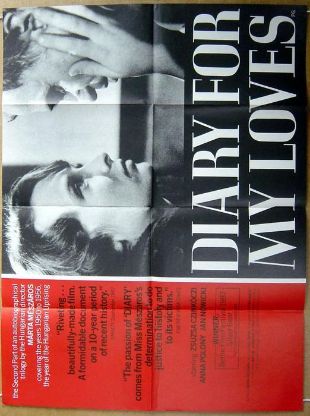The second film of Meszaros’ ‘Diaries’ is an affecting semi-autobiographical tale of a young Hungarian woman with ambitions of becoming a film director, set against the tumultuous backdrop of the Soviet Bloc.

Review #2,184
Dir. Marta Meszaros
1987 | Hungary | Drama/Biography | 126 mins | 1.37:1 | Hungarian
Not rated – likely to be PG13
Cast: Zsuzsa Czinkoczi, Anna Polony, Jan Nowicki
Plot: Orphan Juli, 18, is determined to become a film director and starts studying filmmaking after moving to Moscow. Following Stalin’s death, she returns to Hungary to prepare her diploma film, but soon the 1956 uprising takes place, and Juli is forced to make compromises when it comes to her career.
Awards: Won Silver Bear – Outstanding Single Achievement & OCIC Award (Berlinale)
Source: Hungarian National Film Archive
Accessibility Index
Subject Matter: Moderate – Ambition, History, Memory
Narrative Style: Slightly Complex
Pace: Slightly Slow
Audience Type: General Arthouse
Viewed: MUBI
Spoilers: No
Although Hungarian filmmaker Marta Meszaros remains obscure in the wider cinephilic circles, Diary for My Loves is one of her best-known films, part of her set of cinematic ‘Diaries’. The second film in this series after Diary for My Children (1984), Loves is a semi-autobiographical tale about how she became a filmmaker.
Orphaned when young, Meszaros was raised by her foster mother in the Soviet Union where she would eventually learn the craft of filmmaking at what is now called the Gerasimov Institute of Cinematography (a.k.a. Moscow Film School), the oldest film school in the world that counts Eisenstein, Parajanov, Shepitko, Tarkovsky and Sokurov, just to name a few, as its alumni.
Shot in a sombre if poetic style that characterised many East European films of the 1980s, Loves is an affecting personal work, but what elevates it even further is Meszaros’ acute sense of historical context.
“What do you mean he’s deported?”
As the narrative plays out, she gives us black-and-white footage, some archival, some seemingly staged, that blend seamlessly with the actors in the film—these are footage of key milestones in the experience of living in the Soviet Bloc, tumultuous as it were e.g. the death of Stalin, the Hungarian Revolution, etc.
At the same time, they don’t detract from Meszaros’ personal story and her relationships with the various people she met as she traversed between Hungary and the Soviet Union.
One of the key questions that Loves poses is one that has continually plagued filmmakers of more authoritarian or repressive regimes: how can cinema reveal the truth of the human condition? How can it give voice to and liberate the working class or the disenfranchised?
In the film, Meszaros’ surrogate character is taught the ‘right’ way in school. Her extraordinary body of work, however, shows us otherwise.
Grade: A-












[…] Meszaros, Marta […]
LikeLike
[…] previously saw Diary for My Loves (1987) and Diary for My Father and Mother (1990) first, so going back to this starting point with […]
LikeLike